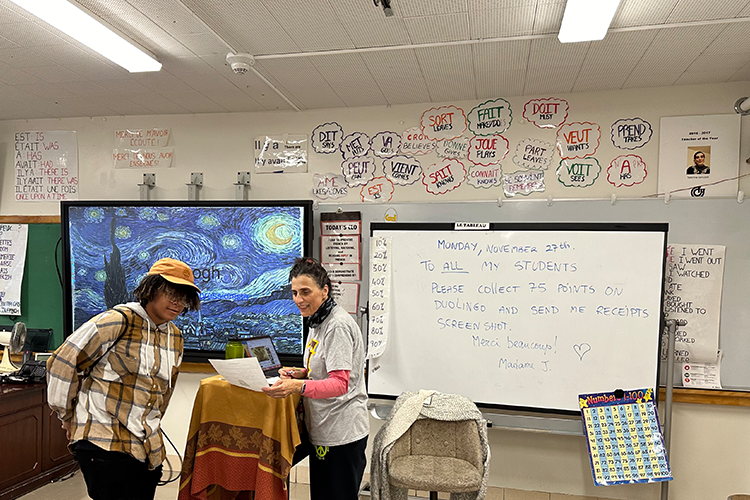
Janczak’s innovative teaching style allows students to acquire rather than memorize. photo by Ravi Apte
Sabrina Janczak has been the one and only French teacher at TJ for the past decade.
After she moved from Paris to Florida in her mid-20’s, following her parents to their French restaurant, Sabrina Janczak’s life changed forever. She grew up in France and was raised by a Spanish-speaking nanny as a child, helping her with language competency in many ways. She utilized that competency in high school, taking many foreign language classes like English, Russian, and Italian, all of which she speaks with “various degrees of fluency.” She also had a long-term Japanese boyfriend in her youth, which helped her to develop skills in writing Hiranga, Katakana, and being able to recognize Kanji.
After moving to the US, Janczak began working in a corporate position. However, after being laid off, she went back to school to become a teacher. “It was a calling. As I remember with great fondness, some of my high school and university teachers had a great influence on me,” Janczak explained. She taught in three different high schools in the Chicago area before coming to TJ. She says she likes the culture at TJ, the students, and the faculty. “It really feels like a family,” Janczak continued. “We are very lucky to have an amazing administration that has our back and supports us in so many different ways.” She wants the TJ community to know that she is truly passionate about her job and that acquiring another language is so much fun, hoping to inspire students to attempt something new. “Learning a new language opens one’s mind to a world of possibilities and fosters tolerance and empathy for other people and their cultures,” said Janczak.
She referred to her teaching style as “informed by Science of Second Language Acquisition,” a theory by Stephen Krashen, an author of over 525 articles and books on the topic of bilingual education. Krashen attests that if a person can acquire their mother tongue, they are also able to acquire any other language the same way. His theory posits that language acquisition does not require extensive use of conscious grammatical rules and does not require tedious drill. He believes that acquisition “requires meaningful interaction in the target language.” Krashen maintains that “conversations with sympathetic native speakers who are willing to help the acquirer understand are very helpful,” and Madame Janczak is certainly that person for her many students. Parents don’t give their baby a book and start conjugating – that’s not how one becomes fluent in their own language. It’s about talking to them, modifying speech – rate of speech, how things are said, and little by little, they acquire.
She acknowledged that learning a language “takes time and commitment, but so does everything else in life.” She affirmed that she speaks to her students in an almost entirely comprehensible way so that “they acquire the language unconsciously, involuntarily, implicitly, and painlessly, as long as they intend on understanding the messages conveyed.”
Janczak adopted this strategy in the methodology class she took at the University of Illinois when she was gaining her Master’s in Education. Her Bachelor’s degree in Applied Behavior Sciences, emphasizes that the application of psychological principles to strategies, interventions, and policies can lead to positive behavioral changes that certainly help when applied to the classroom.
Janczak structures her class the way she does because of those beliefs. “The only way that you’re going to acquire any language is through input in the form of listening and reading. The more you read, the better you will write and the sooner you will speak,” she explained. “It’s always about getting to know each other through those questions.” According to Janczak, finding ways to engage her students with each other, to have conversations that are meaningful, is the true foundation of her class. She recalls having noticed when observing other teachers that the ‘traditional’ teaching often bores their students and isn’t engaging enough to allow them to acquire the language. “I don’t want that, I would never take a book and teach you from a book – never.” Janczak firmly believes that “it’s not how language is meant to be learned, we have to learn to use it for communication purposes.” Outside of school, Janczak’s language teaching continues. She teaches French to adults who want to learn and also proofreads novels for language students and has authored a few of her own. She presents at Language Acquisition conferences across the country to help inform other language teachers of her strategic success with her students. She speaks French with family and friends – her sons and husband fluently understand her mother tongue. As a whole, Janczak continues to be an impressive addition to the TJ community and inspires everyone around her to share in the gift that is acquisition of language.